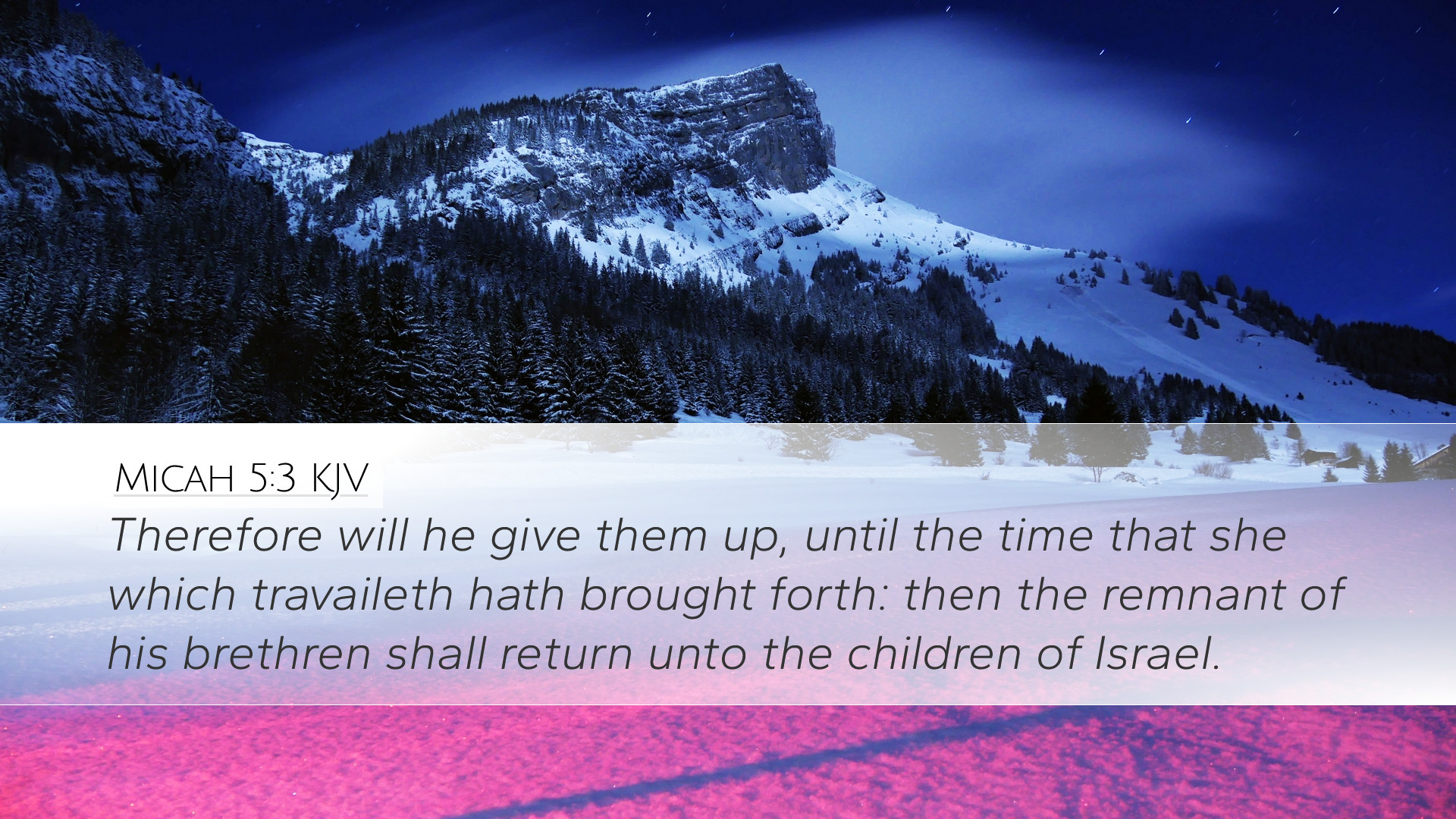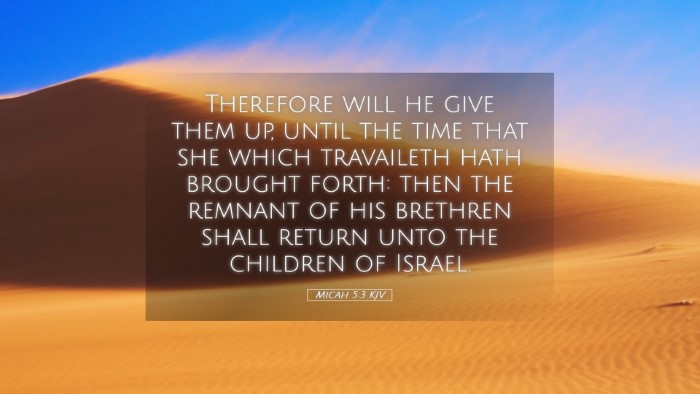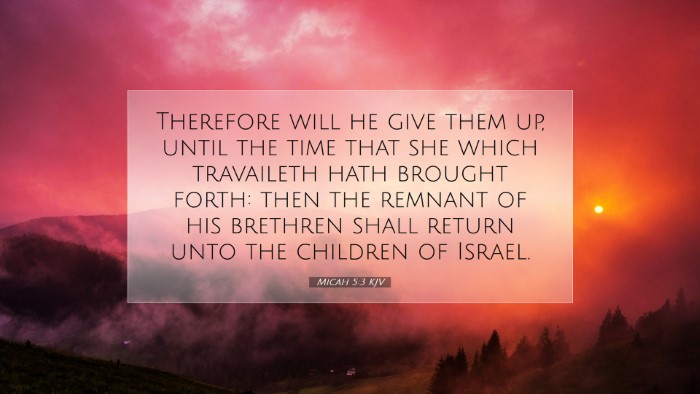Old Testament
Genesis Exodus Leviticus Numbers Deuteronomy Joshua Judges Ruth 1 Samuel 2 Samuel 1 Kings 2 Kings 1 Chronicles 2 Chronicles Ezra Nehemiah Esther Job Psalms Proverbs Ecclesiastes Song of Solomon Isaiah Jeremiah Lamentations Ezekiel Daniel Hosea Joel Amos Obadiah Jonah Micah Nahum Habakkuk Zephaniah Haggai Zechariah MalachiMicah 5:3
Micah 5:3 KJV
Therefore will he give them up, until the time that she which travaileth hath brought forth: then the remnant of his brethren shall return unto the children of Israel.
Micah 5:3 Bible Commentary
Commentary on Micah 5:3
Bible Verse: Micah 5:3 - "Therefore will he give them up, until the time that she which travaileth hath brought forth: then the remnant of his brethren shall return unto the children of Israel."
Introduction
Micah 5:3 stands as a profound prophetic utterance within the book of Micah, articulating themes of judgment, hope, and restoration. This commentary integrates insights from esteemed public domain commentators such as Matthew Henry, Albert Barnes, and Adam Clarke. Their contributions shed light on the historical context, theological significance, and application for contemporary readers, particularly for pastors, students, theologians, and Bible scholars.
Contextual Background
To fully appreciate Micah 5:3, it is vital to consider its place within the larger narrative of the book of Micah. Written during a time of great social injustice and spiritual decline in Israel, the prophet Micah addresses both the Northern and Southern kingdoms, calling for repentance and foretelling impending judgment as well as restoration.
According to Matthew Henry, Micah's message often oscillates between divine judgment and hope for redemption, portraying a God who is both just and merciful. Chapter 5 specifically addresses the coming Messiah's birth in Bethlehem—an event anticipated through prophetic traditions.
Analysis of the Verse
Exegesis
The phrase "Therefore will he give them up" signifies a period of abandonment due to Israel's sins. Albert Barnes emphasizes that this divine abandonment is not permanent but conditional, dependent upon the people’s response to God. The phrase "until the time that she which travaileth hath brought forth" points to the anticipation of a future event—the birth of one who will ultimately lead Israel to restoration.
Theological Insights
This passage is pivotal in demonstrating the dual themes of judgment and hope. Adam Clarke notes that God's discipline is purposeful, designed to lead the remnant back to Him. The concept of a "remnant" is crucial throughout the scriptures, symbolizing those who remain faithful amidst widespread rebellion.
- Judgment: The initial part of the verse communicates God's hardship on Israel for their transgressions, showing that divine justice must be upheld.
- Birth and Hope: The act of travailing hints at painful but necessary labor, symbolizing the difficult path Israel must endure to experience eventual joy and restoration.
- Restoration of the Remnant: The “remnant of his brethren” signifies that God will preserve a faithful remnant who will experience the fulfillment of His promises.
Theological Significance
Micah 5:3 speaks profoundly to God's character. He is a God of patience and love, willing to wait through seasons of judgment for the rebirth of His people. This aligns with the redemptive narrative that runs throughout the Bible—the themes of trial and tribulation leading to eventual salvation are prevalent from Genesis to Revelation.
Barnes asserts that the identification of the phrase "until the time" indicates a divine timetable—a concept that resonates throughout scripture, reminding us that God's plan often unfolds over time, in His timing, not ours.
Historical Application
Pastors and Bible scholars can find rich applications in Micah 5:3 for modern-day congregations. The call for repentance and the revelation of God’s mercy through judgment is a message that remains relevant. Many churches today face challenges that mirror those of ancient Israel.
- Call to Repentance: Just like Israel, contemporary believers are reminded of the importance of turning back to God.
- Hope in Hardship: The promise of restoration offers comfort in trials, encouraging believers to maintain faith in God’s ultimate plan.
- Recognizing the Remnant: Understanding the status of a faithful remnant can equip leaders to encourage those who feel isolated in their faith.
Contemporary Reflections
In our modern context, Micah 5:3 invites us to reflect on our own spiritual and communal journeys. The tension between judgment and hope is palpable in a world fraught with moral decline and societal upheaval. Henry suggests that as believers look towards the return of Christ, they should remain cognizant of their own spiritual state, holding onto the promises of God while anticipating the challenges they may face.
Conclusion
Micah 5:3 encapsulates a vibrant message of hope amidst adversity. By analyzing the prophetic significance of this verse, we are encouraged to embrace God's corrective measures, confident in His promise of restoration. For pastors, students, theologians, and Bible scholars, the study of this verse and its implications enriches our understanding of the nature of God, our call to holiness, and the enduring hope we possess through Jesus Christ.


